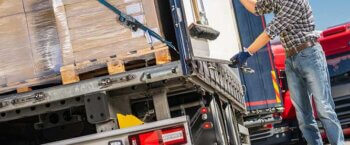Lease Purchase Trucking: Pros, Cons, and Considerations

Make more on every load.
Learn how to maximize profits with the Truckstop Load Board.
If you’re a trucker or thinking about getting into the industry, you might have dreams of becoming an owner-operator. Lease programs can help you get started, but there are several things to consider. Lease purchase trucking has its unique advantages and disadvantages compared to other options, such as being a company driver or a full owner-operator. Here’s what you should know.
What is a lease-purchase program?
A lease purchase program is not the same thing as a lease operator program. Lease operators pay no money down for their equipment but must return it at the end of the contract. In a lease-purchase agreement, or lease-to-own trucking program, you need to make a down payment on the truck, but you own it at the end.
Either way, you operate as a sort of owner-operator leased to company equipment. You’ll drive for the carrier who leased your truck to you. So you won’t have the same freedom as an owner-operator who purchased equipment from a third party. But you’ll have a lot more flexibility than a traditional company driver.
Types of lease purchase programs
There are three basic types of lease purchase or lease operator programs. While all three involve a truck lease, there are significant differences to consider when deciding which is best for you.
- Lease operators. As mentioned, a lease operator leases equipment from the carrier. At the end of the lease, you need to give the truck back. This can be good if you don’t have a down payment saved. But your equipment choices might be limited, and your lease is effectively just a rental contract. If you ultimately want to own your equipment, this isn’t the best choice.
- Leased owner-operators. This is the traditional lease-to-own semi-truck program. You still lease your equipment from a specific carrier and drive for them. But you pay a down payment, usually between $10,000 to $14,000, and at the end of the contract, you own the equipment. You might have a bigger range of truck styles and features to choose from, and you can make more customizations since you don’t have to give the truck back.
- Independent owner-operators. As an independent owner-operator, you can still lease to own a truck if you don’t want to purchase it outright. But you will get your equipment from a third party instead of from a carrier. This gives you the most flexibility to choose exactly the equipment and customizations you want. You also won’t be contracted to a specific carrier unless you want to be.

Pros and cons of lease-purchase trucking
Here we’re looking at just lease purchase programs, not lease operator or independent owner-operator programs.
Pros for owner-operators
- Extra benefits. Some leases include money-saving perks like preventive maintenance costs, driver training, performance reports, or other add-ons. Sometimes they’re automatically included in the lease. Other times, you’ll need to pay a small fee for the benefits you want.
- Brand-new equipment. Most of the time, lease purchase contracts are for new trucks, and you get to choose what you want. If you can’t afford to buy a new truck outright, this can be a great way to avoid potential problems with used equipment.
- Administrative benefits. Arranging a lease purchase through a carrier sometimes also includes administrative tasks. You’ll operate under the carrier’s authority, so you won’t need to worry about all the hassles that come with setting up your authority. The carrier might even help with managing your loads and tracking your hours of service (HOS).
- Permits, license plates, and other requirements. In many cases, the carrier will take responsibility for getting license plates, securing permits, and other housekeeping tasks that eat up time and money.
Of course, every carrier is different, so you’ll need to carefully read the lease-purchase agreement before signing it. Also, research the carrier and how their lease purchase program works. The more you know ahead of time, the better you’ll be able to tell whether a specific contract is right for you.
Cons for owner-operators
- Buyer beware. Most carriers with lease purchase programs are honest and transparent. But don’t just assume that’s the case. Make sure they can deliver on what they promise and understand the needs of lease-purchase drivers. You can be held legally liable for whatever you agree to. So make sure you get any promises in writing and consider having a lawyer look over the contract before signing it.
- Lack of freedom. No matter how great the carrier is, whoever holds your lease also controls your working conditions. Some carriers give their lease purchase drivers more demanding routes that company drivers don’t want. You might not be allowed to pick up loads from other carriers, even when things are slow. Or, you might be responsible for some unexpected costs. Make sure you’re comfortable with all the terms before making your final decision.
- Running your business. This is a potential drawback for all owner-operators, depending on your business sense. As a lease purchase driver, you act as an independent contractor with the carrier. That means you’re responsible for the entire business side of your operations. If you have a good head for business, great! But if you want to focus on driving, being a company driver might be a better choice.
How much do lease purchase truckers make?
Like so much in life, it depends. Lease purchase truckers typically make more than company drivers but less than independent owner-operators. The biggest advantage is that you’ll be able to make good money while working to own your equipment. This is generally true even if you don’t have a stellar credit score.

5 things owner-operators should avoid in a lease-purchase contract
We’ve already talked about how important it is to read your agreement carefully. While carriers can include any provisions they want, here are a few of the more common hidden costs and clauses that you should almost always avoid.
- Balloon payments. When you’re first starting, it’s tempting to look for the lowest possible lease payments. But be careful. If the price is unusually low at the beginning of the contract, you’ll make up for it at the end with what’s known as a balloon payment. This is a potentially huge amount you’ll have to pay at the end of your lease to own the truck. Look for a lease with equal payments, or at least a very small balloon that you’re sure you can afford.
- Early payoff penalties. Paying off your equipment early saves you interest in the long run. It can also serve as an escape clause if you realize you don’t like driving for that particular carrier. But some leases have clauses that prevent you from paying off the lease early (or force you to pay huge penalties). It’s okay to choose a lease that requires you to stick with it for a short time, maybe half the lease term. But you don’t want one that you have to keep until the very end.
- Super-long leases. At some point, you want to own the truck, right? And you want it to be worth something when you do. So steer clear of very long leases. A two-year lease is ideal. But you can extend to three or four years to lower your payments. Anything longer doesn’t make much financial sense.
- Bloated pricing. Don’t just look at the individual payments. Find out what the total cost to own the truck will be. It’s normal for carriers to mark up the price a little to cover that they’re leasing it to you. But if you’re going to end up paying double the actual value, run away fast!
- Smaller paychecks. Though uncommon, some carriers pay their lease operators less than they pay their company drivers or independent owner-operators for the exact same loads! Read the contract carefully to make sure you’re being offered the same rates as everyone else.
Find and book high-paying loads.
The Truckstop Load Board is a great place to find and book high-paying loads regardless of how you get your truck. With access to rate estimates and the ability to build relationships with brokers over time, you’ll be able to quickly decide which loads are right for you. Contact us today to learn more.
Get helpful content delivered to your inbox.
Sign up today.
Find high-quality loads fast, get higher rates on every haul, and access tools that make your job easier at every turn.






